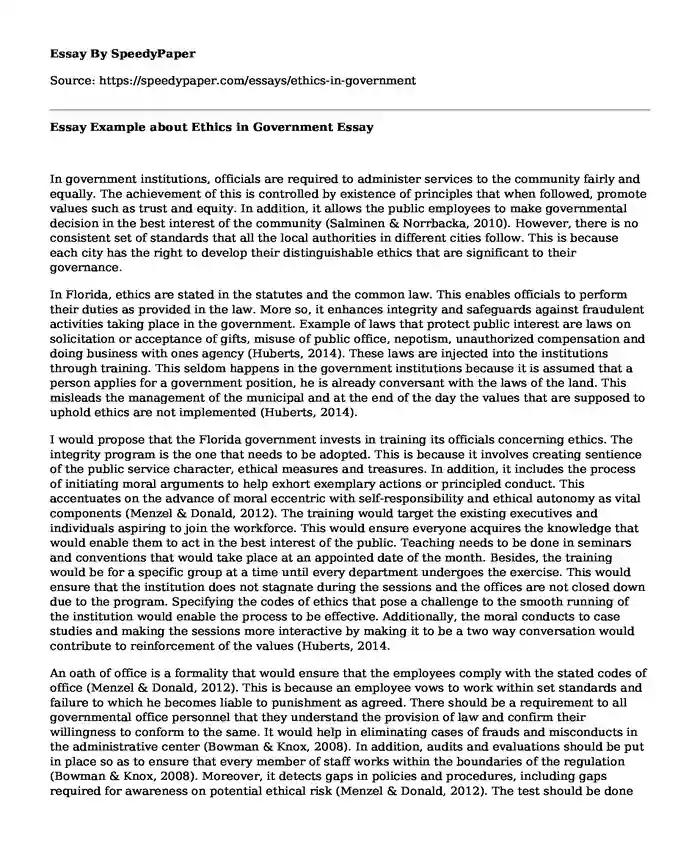
| Type of paper: | Essay |
| Categories: | Government Ethics |
| Pages: | 3 |
| Wordcount: | 724 words |
In government institutions, officials are required to administer services to the community fairly and equally. The achievement of this is controlled by existence of principles that when followed, promote values such as trust and equity. In addition, it allows the public employees to make governmental decision in the best interest of the community (Salminen & Norrbacka, 2010). However, there is no consistent set of standards that all the local authorities in different cities follow. This is because each city has the right to develop their distinguishable ethics that are significant to their governance.
In Florida, ethics are stated in the statutes and the common law. This enables officials to perform their duties as provided in the law. More so, it enhances integrity and safeguards against fraudulent activities taking place in the government. Example of laws that protect public interest are laws on solicitation or acceptance of gifts, misuse of public office, nepotism, unauthorized compensation and doing business with ones agency (Huberts, 2014). These laws are injected into the institutions through training. This seldom happens in the government institutions because it is assumed that a person applies for a government position, he is already conversant with the laws of the land. This misleads the management of the municipal and at the end of the day the values that are supposed to uphold ethics are not implemented (Huberts, 2014).
I would propose that the Florida government invests in training its officials concerning ethics. The integrity program is the one that needs to be adopted. This is because it involves creating sentience of the public service character, ethical measures and treasures. In addition, it includes the process of initiating moral arguments to help exhort exemplary actions or principled conduct. This accentuates on the advance of moral eccentric with self-responsibility and ethical autonomy as vital components (Menzel & Donald, 2012). The training would target the existing executives and individuals aspiring to join the workforce. This would ensure everyone acquires the knowledge that would enable them to act in the best interest of the public. Teaching needs to be done in seminars and conventions that would take place at an appointed date of the month. Besides, the training would be for a specific group at a time until every department undergoes the exercise. This would ensure that the institution does not stagnate during the sessions and the offices are not closed down due to the program. Specifying the codes of ethics that pose a challenge to the smooth running of the institution would enable the process to be effective. Additionally, the moral conducts to case studies and making the sessions more interactive by making it to be a two way conversation would contribute to reinforcement of the values (Huberts, 2014.
An oath of office is a formality that would ensure that the employees comply with the stated codes of office (Menzel & Donald, 2012). This is because an employee vows to work within set standards and failure to which he becomes liable to punishment as agreed. There should be a requirement to all governmental office personnel that they understand the provision of law and confirm their willingness to conform to the same. It would help in eliminating cases of frauds and misconducts in the administrative center (Bowman & Knox, 2008). In addition, audits and evaluations should be put in place so as to ensure that every member of staff works within the boundaries of the regulation (Bowman & Knox, 2008). Moreover, it detects gaps in policies and procedures, including gaps required for awareness on potential ethical risk (Menzel & Donald, 2012). The test should be done with a committee that is independent and trusted so as to avoid irregularities. However, this will lead to insecurities of the staffs about their jobs and eventually lead to turnovers and lack of motivation because it would mean there is mistrust in their performance.
Reference
Bowman, J. S., & Knox, C. C. (2008). Ethics in government: No matter how long and dark the night. Public Administration Review, 68(4), 627-639.
Huberts, L. (2014). The Integrity of Governance: What it is, What We Know, What is Done and Where to Go. Springer.Menzel, Donald C. (2012). Ethics management for public administrators: leading and building organizations of integrity, (2nd edition). Armonk, NY: M.E. Sharpe.
Salminen, A., & Ikola-Norrbacka, R. (2010). Trust, good governance and unethical actions in Finnish public administration. International Journal of Public Sector Management, 23(7), 647-668.
Cite this page
Essay Example about Ethics in Government. (2019, Nov 04). Retrieved from https://speedypaper.net/essays/ethics-in-government
Request Removal
If you are the original author of this essay and no longer wish to have it published on the SpeedyPaper website, please click below to request its removal:
- Essay Sample about Great Educational Background
- Problems with Fast Food, Essay Sample
- Essay Example on Understanding the Attitudes of the Listeners of a Song
- Free Essay Sample on the Bargaining Hypothesis and Politics
- Essay Sample: Literary Analysis of Law in the Example of The Crucible Play
- Free Essay - Labor Movement and Rhetoric
- Essay Example: Questioning Straightforward Corporeality and Penetration
Popular categories




